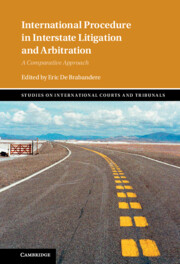Book contents
- International Procedure in Interstate Litigation and Arbitration
- Studies on International Courts and Tribunals
- International Procedure in Interstate Litigation and Arbitration
- Copyright page
- Contents
- Contributors
- Introduction
- Part I Pre-hearing and Selection and Appointment of Judges and Arbitrators
- Part II Post-commencement Litigation Procedure and Strategy
- Part III Evidence and Witness
- Part IV Post-hearing and Effect of Decisions
- 11 Settling a Dispute
- 12 Rule of Precedent and Rules on Precedent
- 13 Cross-Fertilisation and Conflicts between Courts and Tribunals: An Analysis from the Perspective of the United Nations Convention on the Law of the Sea
- Index
12 - Rule of Precedent and Rules on Precedent
from Part IV - Post-hearing and Effect of Decisions
Published online by Cambridge University Press: 18 November 2021
- International Procedure in Interstate Litigation and Arbitration
- Studies on International Courts and Tribunals
- International Procedure in Interstate Litigation and Arbitration
- Copyright page
- Contents
- Contributors
- Introduction
- Part I Pre-hearing and Selection and Appointment of Judges and Arbitrators
- Part II Post-commencement Litigation Procedure and Strategy
- Part III Evidence and Witness
- Part IV Post-hearing and Effect of Decisions
- 11 Settling a Dispute
- 12 Rule of Precedent and Rules on Precedent
- 13 Cross-Fertilisation and Conflicts between Courts and Tribunals: An Analysis from the Perspective of the United Nations Convention on the Law of the Sea
- Index
Summary
The general assessment of the problem of the use of previous decisions in international adjudication usually starts from the many statements to the effect that ‘there is no rule of precedent in international law’. Reliance is mainly placed on specific statutory rules, starting from Article 38(1)(d) of the Statute of the International Court of Justice (ICJ), which is understood to authoritatively reflect the sources of international law and states that the Court ‘shall apply ... judicial decisions’ as ‘subsidiary means for the determination of rules of law’ subject to the operation of Article 59, which appears to rule out any endorsement of a rigid rule (or practice) of stare decisis. These approaches have a common thread: they address the question of the use and authority of previous decisions in international adjudication as one regulated by rules. Yet, they are never found to provide a satisfactory answer to the problem. This chapter offers an alternative to the traditional outlook, challenging the oft-repeated truism that ‘there is no rule of precedent in international adjudication’ by arguing that it is desirable to shift the analysis from an almost mythological rule of precedent – or an equally esoteric belief in a lack thereof – to more tangible rules on precedent. These may – and do – include rules in which a specific understanding of the question is endorsed by the statutory provisions of a specific international adjudicator, but is not exhausted by them, as other rules of different nature and origin (including, but not limited to, organisational directives, rules on submissions, on evidence and on law ascertainment, as well as those concerning systems of challenge, appeal and control) also have an impact – with varying degrees of directness – on the role, possible uses and authority of the past. This study is based on the identification of such rules and their treatment. Its overall purpose is to show how, in the absence of one rule of precedent, the many rules on precedent can contribute to shape the use of the past by international adjudicators, and their mindset in doing so. The approach taken is based on the examination of existing or purported rules, and thus is both rule-based and aimed at rule synthesis. It is not, however, merely descriptive: rather, it also considers implications which could be found useful in the creation of new adjudication mechanisms, and provides insights on potential avenues of reform.
- Type
- Chapter
- Information
- International Procedure in Interstate Litigation and ArbitrationA Comparative Approach, pp. 354 - 400Publisher: Cambridge University PressPrint publication year: 2021

